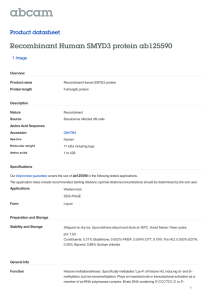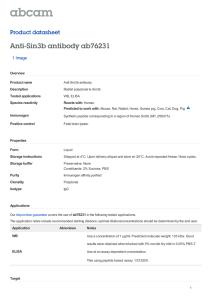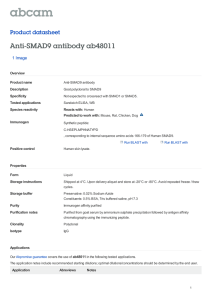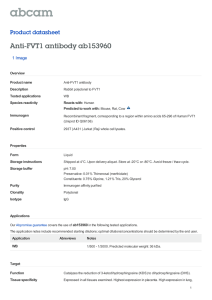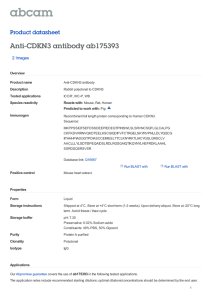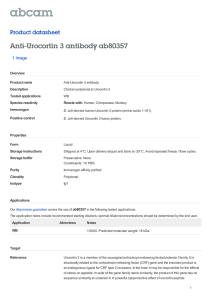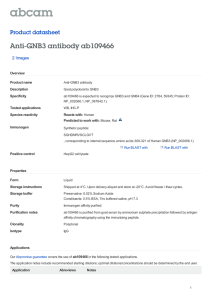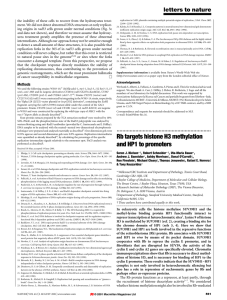Anti-KMT1A / SUV39H1 antibody ab33056 Product datasheet 1 References 2 Images
advertisement
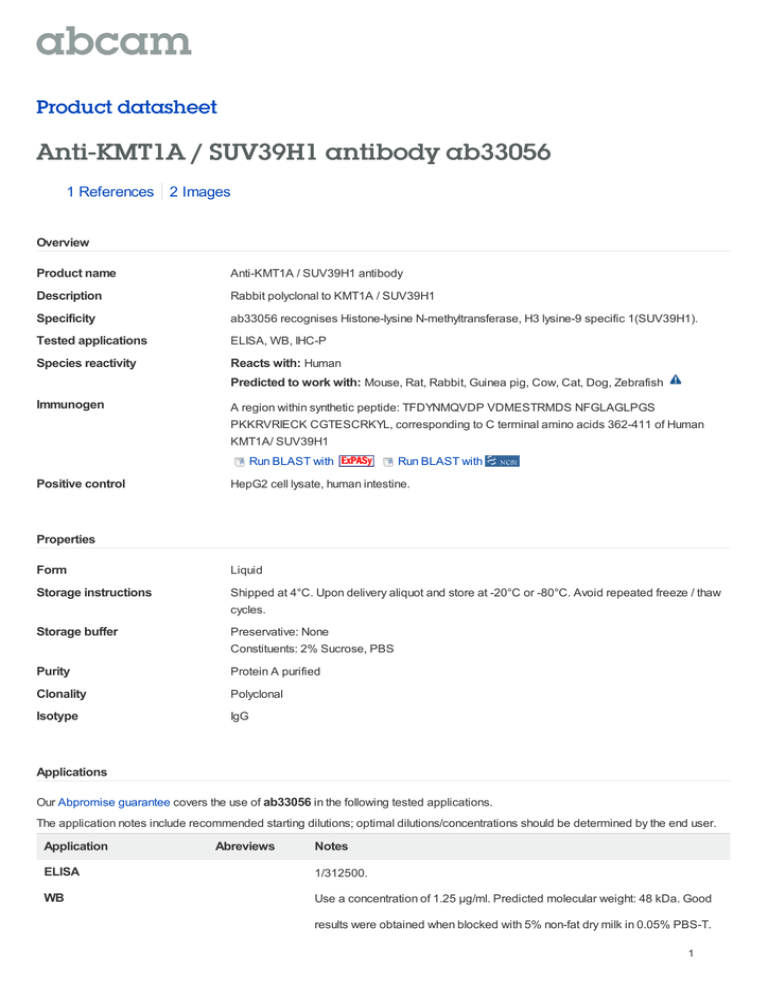
Product datasheet Anti-KMT1A / SUV39H1 antibody ab33056 1 References 2 Images Overview Product name Anti-KMT1A / SUV39H1 antibody Description Rabbit polyclonal to KMT1A / SUV39H1 Specificity ab33056 recognises Histone-lysine N-methyltransferase, H3 lysine-9 specific 1(SUV39H1). Tested applications ELISA, WB, IHC-P Species reactivity Reacts with: Human Predicted to work with: Mouse, Rat, Rabbit, Guinea pig, Cow, Cat, Dog, Zebrafish Immunogen A region within synthetic peptide: TFDYNMQVDP VDMESTRMDS NFGLAGLPGS PKKRVRIECK CGTESCRKYL, corresponding to C terminal amino acids 362-411 of Human KMT1A/ SUV39H1 Run BLAST with Positive control Run BLAST with HepG2 cell lysate, human intestine. Properties Form Liquid Storage instructions Shipped at 4°C. Upon delivery aliquot and store at -20°C or -80°C. Avoid repeated freeze / thaw cycles. Storage buffer Preservative: None Constituents: 2% Sucrose, PBS Purity Protein A purified Clonality Polyclonal Isotype IgG Applications Our Abpromise guarantee covers the use of ab33056 in the following tested applications. The application notes include recommended starting dilutions; optimal dilutions/concentrations should be determined by the end user. Application Abreviews Notes ELISA 1/312500. WB Use a concentration of 1.25 µg/ml. Predicted molecular weight: 48 kDa. Good results were obtained when blocked with 5% non-fat dry milk in 0.05% PBS-T. 1 Application Abreviews IHC-P Notes Use at an assay dependent concentration. Target Function Histone methyltransferase that specifically trimethylates 'Lys-9' of histone H3 using monomethylated H3 'Lys-9' as substrate. Also weakly methylates histone H1 (in vitro). H3 'Lys-9' trimethylation represents a specific tag for epigenetic transcriptional repression by recruiting HP1 (CBX1, CBX3 and/or CBX5) proteins to methylated histones. Mainly functions in heterochromatin regions, thereby playing a central role in the establishment of constitutive heterochromatin at pericentric and telomere regions. H3 'Lys-9' trimethylation is also required to direct DNA methylation at pericentric repeats. SUV39H1 is targeted to histone H3 via its interaction with RB1 and is involved in many processes, such as repression of MYOD1stimulated differentiation, regulation of the control switch for exiting the cell cycle and entering differentiation, repression by the PML-RARA fusion protein, BMP-induced repression, repression of switch recombination to IgA and regulation of telomere length. Component of the eNoSC (energy-dependent nucleolar silencing) complex, a complex that mediates silencing of rDNA in response to intracellular energy status and acts by recruiting histone-modifying enzymes. The eNoSC complex is able to sense the energy status of cell: upon glucose starvation, elevation of NAD(+)/NADP(+) ratio activates SIRT1, leading to histone H3 deacetylation followed by dimethylation of H3 at 'Lys-9' (H3K9me2) by SUV39H1 and the formation of silent chromatin in the rDNA locus. Recruited by the large PER complex to the Ebox elements of the circadian target genes such as PER2 itself or PER1, contributes to the conversion of local chromatin to a heterochromatin-like repressive state through H3 'Lys-9' trimethylation. Sequence similarities Belongs to the class V-like SAM-binding methyltransferase superfamily. Histone-lysine methyltransferase family. Suvar3-9 subfamily. Contains 1 chromo domain. Contains 1 post-SET domain. Contains 1 pre-SET domain. Contains 1 SET domain. Developmental stage Accumulates during mitosis at centromeres during prometaphase, but dissociates from the centromere at the meta- to anaphase transition. Domain Although the SET domain contains the active site of enzymatic activity, both pre-SET and postSET domains are required for methyltransferase activity. The SET domain also participates to stable binding to heterochromatin. In the pre-SET domain, Cys residues bind 3 zinc ions that are arranged in a triangular cluster; some of these Cys residues contribute to the binding of two zinc ions within the cluster. Post-translational modifications Phosphorylated on serine residues, and to a lesser degree, on threonine residues. The phosphorylated form is stabilized by SBF1 and is less active in its transcriptional repressor function. Acetylated at Lys-266, leading to inhibition of enzyme activity. SIRT1-mediated deacetylation relieves this inhibition. Cellular localization Nucleus. Nucleus lamina. Nucleus, nucleoplasm. Chromosome, centromere. Associates with centromeric constitutive heterochromatin. Anti-KMT1A / SUV39H1 antibody images 2 Anti-KMT1A / SUV39H1 antibody (ab33056) at 1.25 µg/ml (in 5% skim milk / PBS buffer) + HepG2 cell lysate at 10 µg Secondary HRP conjugated anti-Rabbit IgG at 1/50000 dilution Predicted band size : 48 kDa Observed band size : 52 kDa gel concentration: 12%. Western blot - SUV39H1 antibody (ab33056) Immunohistochemistry (Formalin/PFA-fixed paraffin-embedded sections) analysis of human intestine tissue labelling KMT1A / SUV39H1 at 4-8µg/ml. Arrows indicate positively labelled epithelial cells of intestinal gland. Immunohistochemistry (Formalin/PFA-fixed paraffin-embedded sections)-Anti-KMT1A / SUV39H1 antibody(ab33056) Please note: All products are "FOR RESEARCH USE ONLY AND ARE NOT INTENDED FOR DIAGNOSTIC OR THERAPEUTIC USE" Our Abpromise to you: Quality guaranteed and expert technical support Replacement or refund for products not performing as stated on the datasheet Valid for 12 months from date of delivery Response to your inquiry within 24 hours We provide support in Chinese, English, French, German, Japanese and Spanish Extensive multi-media technical resources to help you We investigate all quality concerns to ensure our products perform to the highest standards If the product does not perform as described on this datasheet, we will offer a refund or replacement. For full details of the Abpromise, please visit http://www.abcam.com/abpromise or contact our technical team. Terms and conditions Guarantee only valid for products bought direct from Abcam or one of our authorized distributors 3
